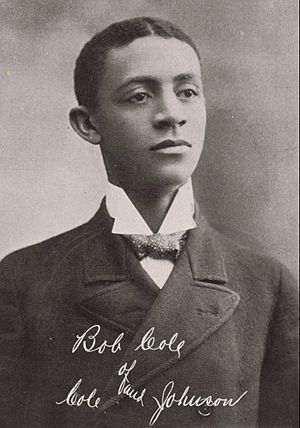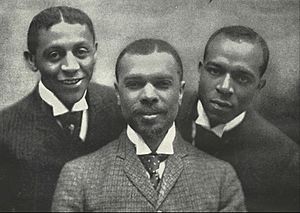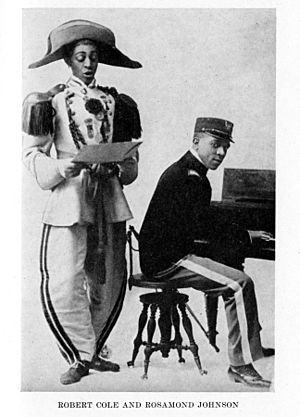Bob Cole (composer) facts for kids
Robert Allen Cole Jr. (born July 1, 1868 – died August 2, 1911) was an American composer, actor, and playwright. He also produced and directed stage shows.
Cole worked with Billy Johnson to create A Trip to Coontown in 1898. This was a very important musical. It was the first musical completely made and owned by black showmen. Their song La Hoola Boola (1898) was also very popular. Later, Cole teamed up with brothers J. Rosamond Johnson and James Weldon Johnson. J. Rosamond was a pianist and singer. James Weldon was a pianist, guitarist, and lawyer. Together, they wrote over 200 songs.
Their vaudeville acts included classical piano music. Their musicals had clever lyrics. They avoided common stereotypes, like "hot-mamas" or watermelons. Because they were so successful, Cole and Rosamond toured America and Europe. Some of their most famous songs were "Louisiana Lize" and "Under the Bamboo Tree" (around 1901). Their best musicals were The Shoo-Fly Regiment (1906) and The Red Moon (1908). James Weldon did not work on The Red Moon.
Cole was a top leader in black musical theater. He was great as a composer and a performer. His acting, writing, and directing skills were clear in his early works. First, he produced “A Trip to Coontown” with Billy Johnson. Then, he worked with J. Rosamond Johnson on popular songs like “Under the Bamboo Tree.”
Cole passed away in 1911 after becoming very unwell. His health had gotten worse in 1910.
Contents
Bob Cole's Early Life
Not many details are known about Bob Cole's early life. This is before he became famous in black musicals.
Cole was born in Athens, Georgia. His parents, Robert Allen Cole Sr. and Isabella Thomas Weldon, settled there. This was after black people gained freedom through the Emancipation Proclamation. Athens, Georgia, was recovering from the war. It also had a lot of racism. But it became a successful city for African American families. Many black people worked as barbers, blacksmiths, and shoemakers. Athens also had one of the first black newspapers. This showed how much education was growing for black people.
Cole's father, Robert Cole Sr., used these chances. He became well known for his political work. This was during the Reconstruction era in the South. Robert Cole Sr. was involved in politics from 1867 to 1873. He helped the Georgia State Legislature. His political role might have shaped his son's beliefs. This was especially true about the challenges faced by African Americans. Later, Bob Cole's father became a carpenter. He supported his family and their home on Broad Street.
Childhood and Growing Up
Bob Cole was born on July 1, 1868. He was the oldest of six children. His family loved music. Both his parents were square dancers. His father also played drums. All the children learned to play musical instruments. Bob played many instruments, like the banjo, piano, and cello. He even started his own family band with his sisters.
When he was fifteen, Bob had a serious argument. It was with the son of the mayor of Athens. Bob had to leave town. He went to live with his mother's relatives in Florida. Soon after, his family moved to Atlanta, Georgia. Bob joined them there. In Atlanta, Bob went to elementary school. He might have gone to high school too. But he did not go to college. Instead, Bob got a job at Atlanta University. His sister said he learned a lot there. He was in a place full of knowledge.
Early Music Jobs
Cole stayed focused on music. He moved to Florida and joined a small string quartet for a short time. Later, he worked at a resort in Asbury Park, New Jersey. He was a "singing bellboy" there. Then, he moved to Chicago. He became a comedian, telling jokes, singing, and playing guitar in clubs.
He became interested in vaudeville plays. These were variety shows. He also liked the black musical style, including "coon songs." This interest grew from working with his friend Lew Henry. Lew was also an amateur performer. They tried to create a vaudeville act together. But it did not work out.
After this, Cole went to New York. New York was a great place for new actors. He teamed up with Pete Staples, a famous mandolin player. Cole was the funny part of their act. But their partnership ended quickly. There is not much information about Cole's early training. So, it is hard to know how he became a top black composer.
Cole focused on comedy in his early work. But he did not do "medicine shows" or circuses. These were common for black performers back then. He also refused to use blackface makeup. This was common in early minstrel shows. Instead, he created his own entertainment. He did this either alone or with partners.
Becoming a Star: The Creole Show
Bob Cole slowly became popular in black musicals. In the early 1890s, he published two songs. These were "Parthenia Took a Likin’ to a Coon" and "In Shin Bone Alley." The songs showed his funny side. They had a minstrel-like style.
His growing fame led to more chances. He was hired as a comedian by Sam T. Jack. Jack was a white businessman. He created The Creole Show. This show was special. It featured black women performers, which was rare. It also broke away from black stereotypes. It did not use the usual slave plantation setting. The Creole Show was influenced by vaudeville. It focused on beautiful showgirls. It also brought back the cakewalk dance.
Cole became very popular in The Creole Show. He went from a regular comedian to the main star. His success led him to create his own stage character. This character was Willy Wayside, a red-whiskered hobo. He played this character for seven years.
By 1896, Cole's fame grew even more. He published four "Genuine Negro songs." These were "Fly, fly, fly," "Move up, Johnson," "Colored aristocracy," and "Dem golden clouds." Cole's popularity grew quickly. He was in top shows like “Black America.” Soon, he became a writer and stage manager for The Creole Show. In the early 1890s, he also worked with Stella Wiley. She was a dancer from The Creole Show and later became his wife. Their partnership led to performances from New England to New York. Around 1894, he formed the All-Star Stock Company. This group trained actors, comedians, and singers. Their first show was called Georgia 49.
Black Patti's Troubadours: From Fame to Trouble
Later, in 1896, Cole became important in the first shows by Black Patti’s Troubadours. This was an American vaudeville group. It was started by Sissieretta Jones, known as “The Black Patti.” Their shows had blackface minstrel songs and "coon songs." They also featured acrobats and comedians.
Cole worked with this group. He also became involved with the Isham shows. These shows often had comedy sketches and vaudeville acts. These acts included jugglers, singers, and comedians. The shows ended with opera-like singers. Cole also managed his own Troubadour show. In it, he played Willy Wayside, the tramp. He performed a routine with Stella Wiley. This skit included two of his own songs: "4-11-44" and "The Four Hundred's Ball."
Cole became a top performer. But his hard work did not lead to higher pay. So, he left the company. He took his own written scripts and songs with him. The company's white managers, Voelckel and Nolan, called him a thief. They said he was a troublemaker. This hurt his reputation. No other production manager would hire him. Cole had to publish songs under a different name. He used the name Will Handy for his later works.
A Trip to Coontown
Cole soon started his own black production company. He formed it with people who also left the Troubadours. In 1898, he worked with Billy Johnson and Will Accooe. They wrote the lyrics and music for A Trip to Coontown. This show was a longer musical program. It became known as the first black musical comedy.
The musical had only black actors. It used traditional minstrel stereotypes. It told the story of Jimmy Flimflammer, a trickster. He tried to steal an old man's pension. The play also had funny acts to keep the audience interested.
Some people argue that A Trip to Coontown was not the very first black musical. Black musicals came from many types of stage entertainment. These included opera, comic opera, and minstrel shows. So, it is possible that other black companies made similar plays before.
The show first opened in South Amboy, New Jersey, on September 27, 1897. The show faced problems. It was banned from showing in the United States. But it became popular in Canada. Later, it was brought back and shown in New York. Theater promoters Klaw and Erlanger helped Cole. They ended his ban from the theater world. They helped bring the show to the public.
However, Black Patti's Troubadours still tried to hurt Cole's career. They put on shows at the same time as A Trip to Coontown. They wanted to steal the audience. Cole and Johnson may have found out about this plan. They might have avoided the problem by ending their contract with Michael Levitt. But Cole could not avoid a lawsuit from Levitt. Levitt fined Cole and Johnson $1000.
Cole's company faced many challenges. There were money problems and transportation issues. The competition from the Black Patti group was also constant. But Cole's group succeeded. This was thanks to his great management skills. He was also very creative in black show business. By 1900, A Trip to Coontown stopped its shows. The partnership between Cole and Billy Johnson ended.
Working with the Johnson Brothers: A New Path
In 1899, Cole met two brothers from Jacksonville, Florida. They changed his career in show business. His partnership with James Weldon and J. Rosamond Johnson lasted until Cole retired in 1911. Cole's work with the Johnson brothers showed he was moving away from "coon songs."
There is not much information about why Cole changed his style. One reason might be that he wanted to attract a more educated audience. He stopped playing his Willy Wayward character. Instead, he took on a more serious and respected role. His partners might have influenced this change. Both of them had college degrees. Cole's own political ideas at the time might also have played a part.
Cole and the Johnson brothers created high-class vaudeville acts. These shows were elegant and sophisticated. The performers wore evening dresses. Cole seemed to care about the political issues of his time. This is shown by his change to creating shows for a more elite audience. His interest in black politics was also clear from his scrapbook. It did not have many newspaper clippings about his own success. Instead, it mostly had clippings about the Waller Affair.
The Waller Affair was about John L. Waller being put in prison. This happened because of political fights between Madagascar and France. French rulers claimed to protect Madagascar. But they did not support black developers. A French court said Waller leaked information to the enemy. He was sentenced to twenty years in prison. Cole felt a connection to Waller. Both were activists who spoke out against unfair treatment of African Americans. They believed in helping their own people.
Cole seemed like a carefree showman. It looked like his only goal was to be famous. But he planned his shows very carefully. He thought about every detail. For example, he considered the exact timing of his songs. He also made sure every part of the performance was done right.
Many songs by the Cole-Johnson team were used in bigger shows. These shows were by Klaw and Erlanger. Their shows appealed to white audiences. This helped the black composers' songs become known to white communities. The songs were more sophisticated than earlier works. The lyrics were not about aggressive black men. Instead, they were sentimental, romantic, and sometimes sad.
Also, their humor was more human. It did not include racial comments or stereotypes. In general, their shows were more refined. They focused on attracting the interest of the upper class. Their songs were successful because of both partners' talents. Rosamond Johnson had advanced musical training and piano skills. Cole had new ideas for writing music. Their partnership changed black entertainment. It moved audiences towards a more refined type of black music. Cole and Johnson not only changed people's taste in music. They also tried to educate the public. They wanted to stop the return to degrading "coon songs."
Cole's Impact on Black Entertainment
By 1902, Cole was very successful financially. He wrote an article called The Negro and the Stage. In it, he shared his worries. He was concerned about the bad image given to African-American performers. For example, he criticized using black villains in entertainment. He felt this made African Americans look bad. It also supported the racist idea of violent black men. He also spoke out against plays like Uncle Tom's Cabin that used black stereotypes.
Cole criticized the common use of aggressive black characters. He argued it gave black actors a bad image. But he ended his article with a hopeful vision. He saw a bright future for black performers. A future where stereotypes and racism would be gone. He believed African Americans would change the entertainment world.
Cole was a revolutionary figure. He helped remove the degrading ways black performers were shown. He pushed black entertainment towards a more respected and dignified future.
See also
- African American musical theater
 | Stephanie Wilson |
 | Charles Bolden |
 | Ronald McNair |
 | Frederick D. Gregory |




